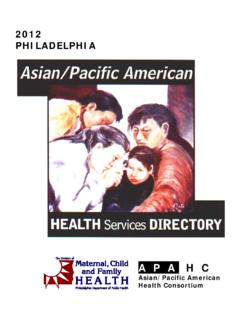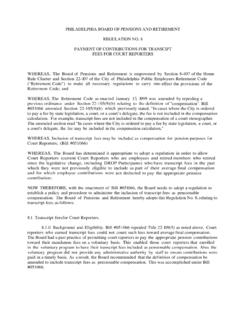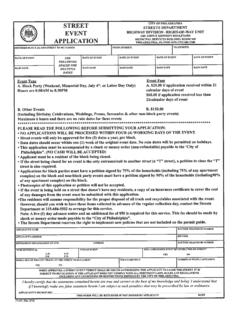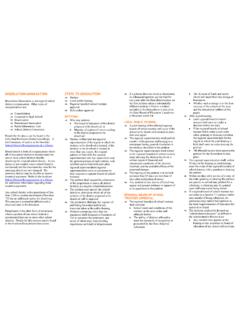Transcription of WHO MUST FILE WHICH FINANCIAL DISCLOSURE …
1 Note: The Board of Ethics coordinates the FINANCIAL DISCLOSURE process for the City but has jurisdiction only over the filing of the City Form. Definitive rulings on legal questions concerning the State Form should be addressed to the State Ethics Commission. Definitive rulings on legal questions concerning the Mayor's Form should be addressed to the Chief Integrity Officer in the Mayor's Office. WHO MUST FILE WHICH FINANCIAL DISCLOSURE FORM. There are three (3) FINANCIAL DISCLOSURE forms. They are the City Form (required by the City Ethics Code), the Mayor's Form (required by an executive order), and the State Form (required by the State Ethics Act). 1. City Form. All officials who now hold, or at any time during the current or the previous calendar year held, the following positions are required to file the statement setting forth all FINANCIAL interests held during the previous calendar year, as required by Philadelphia Code Section 20-610.
2 Mayor Director of Commerce City Councilmembers Fire Commissioner Managing Director Personnel Director Director of Finance Procurement Commissioner City Solicitor City Treasurer Water Commissioner Commissioner of Records Streets Commissioner City Controller Human Services Commissioner Sheriff Health Commissioner City Representative Police Commissioner District Attorney Revenue Commissioner City Commissioners Commissioner of Licenses & Inspections All City Board and Commission Members Parks & Recreation Commissioner (and alternates), whether or not Commissioner of Public Property compensated. Mayor's Office Staff1. 1. As required by Executive Order #11-14. Page 1 of 5 (Rev. 3/16). 2. Mayor's Form. Mayor's Executive Order #11-14, as amended, requires all persons who presently hold the following positions to file: Mayor City Solicitor Chief of Staff to the Mayor City Representative Deputy Mayors Director of Commerce Managing Director Inspector General Director of Finance Chief Integrity Officer Pursuant to Mayor's Executive Order #11-14, the Mayor may designate additional City officials to complete the Mayor's Form.
3 Mayor Kenney designates the following positions: Chief Administrative Officer Deputy Managing Director for Director of Planning & Development Infrastructure & Transportation Chief Diversity & Inclusion Officer Deputy Managing Director for Parks, Chief Education Officer Recreation, & Culture First Deputy Managing Director Deputy Managing Director for Criminal Deputy Managing Director for Children Justice & Families Deputy Managing Director for Deputy Managing Director for Community Services Emergency Management 3. State Form. The State Ethics Act2 provides that each public employee and public official shall file a statement of FINANCIAL interests for the preceding calendar year no later than May 1 of each year he holds such a position and of the year after he leaves such a position.
4 A. Public Employees The determination of whether a City worker is a public employee is based on job duties. The State Ethics Regulations3 describe a public employee as follows: Public employee . (i) The term includes an individual who is employed by the Commonwealth or a political subdivision and who is responsible for taking or recommending official action of a nonministerial4 nature with regard to one or more of the following: 2. 65 Pa. 1101 et seq. 3. 51 Pa. Code et seq. 4. Nonministerial action: An action in WHICH the person exercises his own judgment as to the desirability of the action taken. Ministerial action: An action that a person performs in a prescribed manner in obedience to the Page 2 of 5 (Rev.)
5 3/16). (A) Contracting or (B) Administering or monitoring grants or (C) Planning or (D) Inspecting, licensing, regulating or auditing a (E) Other activities in WHICH the official action has greater than a de minimis economic (ii) The following criteria will be used, in part, to determine whether an individual is within the definition of public employee : (A) The individual normally performs his responsibility in the field without onsite supervision. (B) The individual is the immediate supervisor of a person who normally performs his responsibility in the field without onsite supervision. (C) The individual is the supervisor of a highest level field office. (D) The individual has the authority to make final decisions.
6 (E) The individual has the authority to forward or stop recommendations from being sent to the person or body with the authority to make final decisions. (F) The individual prepares or supervises the preparation of final recommendations. (G) The individual makes final technical recommendations. (H) The individual's recommendations or actions are an inherent and recurring part of his position. (I) The individual's recommendations or actions affect organizations other than his own organization. (iii) The term does not include individuals who are employed by the Commonwealth or a political subdivision of the Commonwealth in teaching as distinguished from administrative duties. mandate of legal authority, without regard to or the exercise of the person's own judgment as to the desirability of the action being taken.
7 5. Contracting or procurement: Awarding a contract or making a decision to purchase by the preparation of requests for bids and proposals, the solicitation and evaluation of proposals or the selection of a vendor. The term does not include contracting or purchasing through master contracts or purchasing schedules already awarded. 6. Administering or monitoring grants: Directing, supervising or approving the expenditure or reimbursement of grant funds or monitoring another person's or organizations administering of grant funds. The term does not include compiling expenditures, comparing actual to planned expenditures or reimbursements, preparing comparative reports or completing grant proposals or reimbursement forms under specific direction.
8 7. Planning or zoning: An action WHICH is directed by a planning commission, zoning board, department, agency or governmental body WHICH involves the regulation of real property. 8. Inspecting, licensing, regulating or auditing: The normal meanings of the terms apply, but the terms do not include activities WHICH are exclusively internal in nature, such as auditing the internal process of an organization, and clerical and procedural activities in issuing permits and licenses. 9. De minimis economic impact: An economic consequence WHICH has an insignificant effect. Page 3 of 5 (Rev. 3/16). (iv) Persons in the following positions are generally considered public employees: (A) Executive and special directors or assistants reporting directly to the agency head or governing body.
9 (B) Commonwealth bureau directors, division chiefs or heads of equivalent organization elements and other governmental body department heads. (C) Staff attorneys engaged in representing the department, agency or other governmental bodies. (D) Engineers, managers and secretary-treasurers acting as managers, police chiefs, chief clerks, chief purchasing agents, grant and contract managers, administrative officers, housing and building inspectors, investigators, auditors, sewer enforcement officers and zoning officers in all governmental bodies. (E) Court administrators, assistants for fiscal affairs and deputies for the minor judiciary. (F) School superintendents, assistant superintendents, school business managers and principals.
10 (G) Persons who report directly to heads of executive, legislative and independent agencies, boards and commissions except clerical personnel. (v) Persons in the following positions are generally not considered public employees: (A) City clerks, other clerical staff, road masters, secretaries, police officers, maintenance workers, construction workers, equipment operators and recreation directors. (B) Law clerks, court criers, court reporters, probation officers, security guards and writ servers. (C) School teachers and clerks of the schools. B. Public Officials In addition to public employees, any City official who meets the definition of public official in the State Ethics Regulations also must file the State Form.


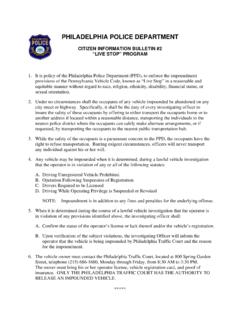

![[PSA] Philly: Classaction lawsuit brings changes in …](/cache/preview/1/4/c/8/8/d/5/c/thumb-14c88d5c5b2f1fee5e561fc7daceb397.jpg)


